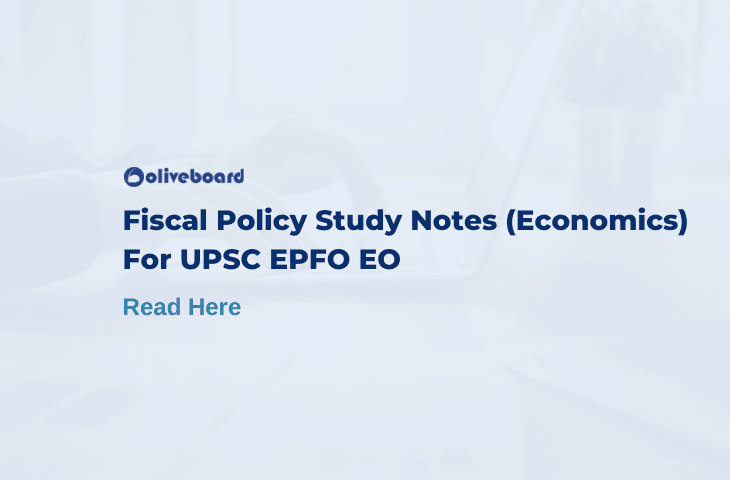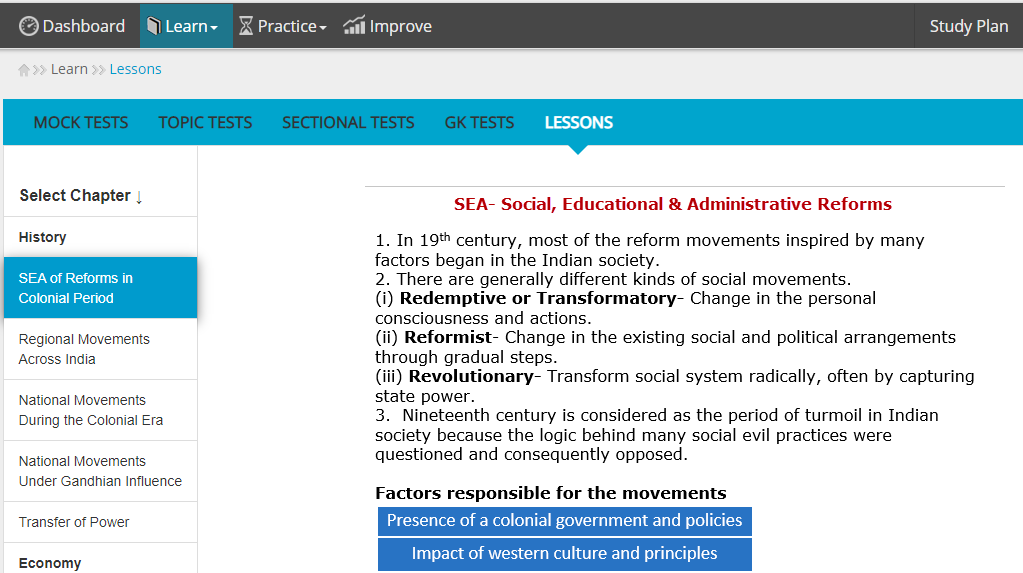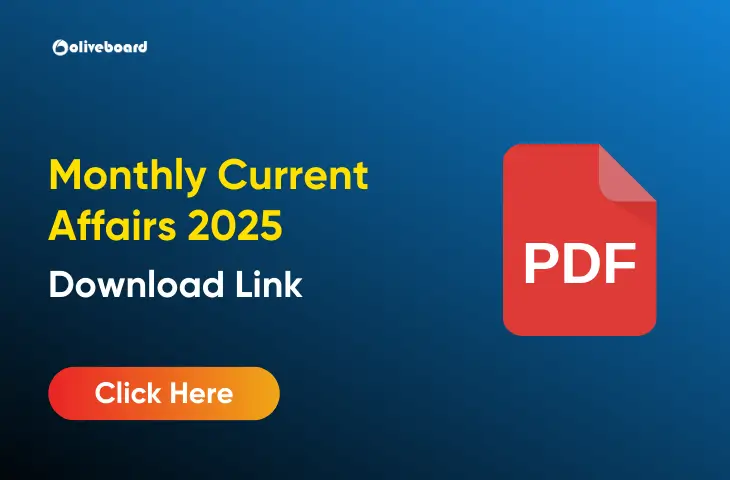The UPSC EPFO Enforcement Officer exam sees a fair share of questions from the Indian Economy topic. Since the course is vast, it becomes all the more important to cover every topic with a certain amount of time left for revision. Now with exam dates deferred, you have a good opportunity to cover up your syllabus effectively. In this article, we will be providing you with complete Fiscal Policy study notes to master the topic.
Register Here & Take A Free Mock Test For UPSC EPFO EO
Fiscal Policy is one of the important topics when it comes to exam preparation. It is also often seen in various bank and government exams mains paper or is also asked in the interview. So, let’s make the most of this article and make sure you do not miss out on any question asked from this topic.
Let’s Read along:
1. Fiscal Policy Study Notes – UPSC EPFO EO 2021
Fiscal policy is the means by which the government adjusts its spending levels and tax rates to monitor and influence the nation’s economy. Fiscal policy is a result of several component policies or a mix of policy instruments. These include the policy on taxation, subsidy, welfare expenditure, etc; investment or disinvestment strategies; and debt or surplus management.
1.1 Objectives of Fiscal Policy:
- First and the foremost objective is to maintain and achieve full employment in the country.
- To stabilize the general price level in the economy.
- To stabilize the growth rate of the economy.
- To maintain equilibrium in the Balance of Payments.
- To promote the economic development of a country.
Prepare For UPSC EPFO EO With Oliveboard. Start Now With A Free Mock Test!
1.2 Types of Fiscal Policy
Expansionary Fiscal Policy: It is generally used for giving a boost to the economy i.e. to speed up the rate of growth of the economy or during a recession when growth in national income is not sufficient enough to maintain the present standards of living of the population. A tax cut and/or an increase in government spending would be implemented to boost economic growth and lower unemployment rates. This is not a sustainable policy, as it leads to budget deficits and thus, should be used with caution by the government.
Contractionary Fiscal policy: It involves raising taxes or cutting government spending so that government spending is less than the tax revenue. It cuts upon the aggregate demand in the economy and thus economic growth leading to a reduction in inflationary pressures in the economy.
Neutral Fiscal Policy: This implies a balanced budget where government spending is equal to the tax revenue. It further means that government spending is fully funded by tax revenue and, the overall budget outcome has a neutral effect on the level of economic activity.
1.3 Components of Fiscal Policy:
There are four key components of Fiscal Policy are as follows:
- Taxation Policy – The government gets its revenue by imposing taxes both direct and indirect. It is very important for the government to follow a judicious taxation policy and impose correct tax rates because of following two reasons – higher taxes will cause a reduction in the purchasing power of the people leading to decrease in production and investment and lower taxes will leave more money with the general public leading to high spending levels and thus high inflation.
- Expenditure Policy – Government Expenditure includes Revenue expenditure and capital expenditure. The government budget is the most important instrument embodying the expenditure policy of the government. The budget is also used for deficit financing i.e.filling the gap between Government spending and income.
- Investment & Disinvestment Policy – Optimum levels of domestic as well as a foreign investment are needed to maintain economic growth.
- Debt and Surplus Management – If the government received more than it spends, it is called a surplus. If the government spends more than income, then it is called a deficit. To fund the deficit the government has to borrow from domestic or foreign sources. It can also print money for deficit financing.
Topper took the test & scored 105/120. Can You Beat The Score?
2. Economic Effects Of The Fiscal Policy
Governments use fiscal policy to influence the level of aggregate demand in the economy so that certain economic goals can be achieved:
- Price stability;
- Full employment;
- Economic growth.
The Keynesian view of economics suggests that increasing government spending and decreasing the rate of taxes are the best ways to have an influence aggregate demand, stimulate it, while decreasing spending and increasing taxes after the economic expansion has already taken place.
Additionally, Keynesians argue that expansionary fiscal policy should be used in times of recession or low economic activity as an essential tool for building the framework for strong economic growth and working towards full employment.
In theory, the resulting deficits would be paid for by an expanded economy during the expansion that would follow; this was the reasoning behind the New Deal.
Governments can use a budget surplus to do two things:
- to slow the pace of strong economic growth;
- to stabilize prices when inflation is too high.
3. Few Methods To Fund Fiscal Policy
Governments spend money on a wide variety of things, from the military and police to services such as education and health care, as well as transfer payments such as welfare benefits. This expenditure can be funded in a number of different ways:
- Taxation
- Seigniorage, the benefit of printing money
- Borrowing money from the population or from abroad
- Dipping into fiscal reserves
- Sale of fixed assets (e.g., land)
Get Complete Study Notes By Registering Here
4. UPSC EPFO EO 2021 – Complete Study Notes
Get Complete Fiscal Policy Study Notes and more on Oliveboard. Find notes on following topics on our platform:
- History
- Economy
- Industrial Relations & Labor Law
- Science
- Social Security
- Computer Knowledge
4.1 Here’s a Sneak Peek in The UPSC EPFO EO Notes
Get Complete Study Notes For UPSC EPFO EO Here
That brings us to the end of this article. We hope that the Fiscal Policy study Notes provided here proves useful to your preparations. Now you can get complete study notes for the preparations of the enforcement officer exam on Oliveboard along with the Mock Tests that are specially designed for the UPSC EPFO, keeping in mind the pattern and difficulty level.
You can click on the image below to know all about the Mock Tests and the study notes.
Also, Check:
- 100+ Free Mock Tests
- Oliveboard Mobile App
- Oliveboard’s discuss forum
- Oliveboard Telegram Group
- Download BOLT – Our Monthly General Awareness free e-book
Recommended Free Downloads
- 40 Geometry Formulas PDF, Download Here & Practice Questions
- Static GK BOLT For Government Exams – Free General Knowledge PDF Notes
- Medieval Indian History Notes| Free Pdf
- Weekly Current Affairs 2025 PDF For Bank, SSC, UPSC Exams
- Monthly Current Affairs 2025 PDF For SSC, Banking, Railways
- Practice Wrong Number Series for Banking Exams 2025 Solved Questions

Hello there! I’m a dedicated Government Job aspirant turned passionate writer & content marketer. My blogs are a one-stop destination for accurate and comprehensive information on exams like Regulatory Bodies, Banking, SSC, State PSCs, and more. I’m on a mission to provide you with all the details you need, conveniently in one place. When I’m not writing and marketing, you’ll find me happily experimenting in the kitchen, cooking up delightful treats. Join me on this journey of knowledge and flavors!







